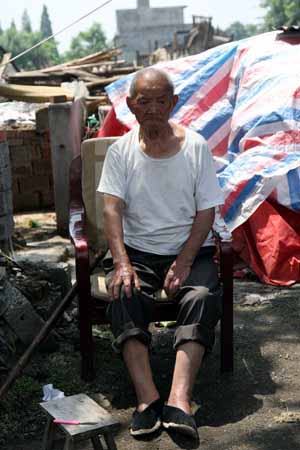"I don't care whether I live or die, but who will look after him? Since the earthquake he hasn't been able to do anything for himself. I even have to take him to the toilet. A tank shell couldn't kill him but the earthquake has done for him. We're coming towards the end of our lives, and now this. I don't know what to do." Her husband sat nearby staring blankly into space, apparently unaware of his surroundings. We all felt helpless, even the capable, can-do Red Cross workers.

82 year old People's Liberation Army veteran Fu Qingyou outside his wrecked home. Mr. Fu was wounded by a tank shell in the Korean War nearly 60 years ago, but until the earthquake had been in relatively good health. Since May 12 he has not spoken a word or walked a step unaided. His wife, Huang Dexiu, who is in her 70s, told us she did not know how she would cope with caring for him.
But amid all of the pain and the terrible loss and waste, Jiulong is an example, much like the successful draining of the Tangjiashan quake lake, of how prompt, effective action can avert the worst outcomes.
Despite fears of water pollution there has been no post-disaster epidemic. Doctors at a field hospital supplied by the city of Tangshan, scene of an even more devastating earthquake in 1976, are mainly treating people who have injured their ankles clambering through the rubble, or have been bitten by the town's dogs, which were apparently driven mad by the earthquake. They told us they were thinking of shutting up shop and moving the hospital to another town with more urgent need of their assistance.
The government has mounted a massive relief and reconstruction effort in the area. What looks to me like a division of the PLA Navy is erecting hundreds of prefabricated dwellings just outside the town. The PLA is also willingly pitching in to help the relief work of both Chinese and international NGOs. When we arrived at the base camp of the International Red Cross, we found dozens of troops helping unload supplies of prefabricated latrines and water purification equipment.
Overseas NGOs, particularly the Red Cross, have played a major role supplementing and plugging the gaps in the government relief effort. And without exception, the NGO staffers we spoke to were full of praise both for the government's relief and reconstruction work, and for the level of cooperation NGOs were receiving from at every level. Jaime Bara, leader of the Spanish Red Cross team in Jiulong, a veteran of many overseas missions, starting with Rwanda in 1994, told us he had never seen such a level of cooperation from the authorities in any other country. My judgment, for what it is worth, is that his words were heartfelt, not diplomat-speak.